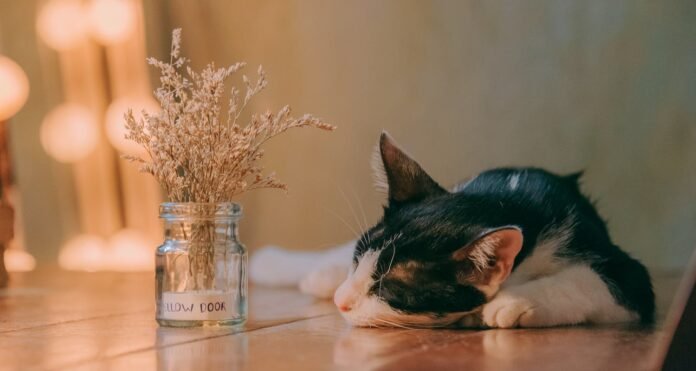Cats need to eat good quality food to keep them healthy. The problem is that so many different kinds of wet and dry cat foods on the market are expensive. Here are some ways that you can feed your cat without resorting to feeding them unhealthy foods or table scraps.
To help your aging cat feel cozy, place a warmed tile under his bed. Just heat a one-foot square terra cotta tile in your oven at about 200 degrees for 15-20 minutes. Use an old towel to wrap it up safely before placing it beneath your cat’s favorite napping spot. If possible, re-heat several times throughout the night.
To keep your cat happy and healthy, its important to schedule regular visits to the vet. Not only are regular checkups good for catching problems early, but regular visits can insure that your cat keeps up to date on its vaccinations. If you don’t know when the last time your cat had its shots, schedule an appointment for booster shots as soon as possible.
For a healthier, happier cat choose plain litter over scented litter. Cats like nice, clean, clumping cat litter. Scoop your cats litter box daily and change it completely every three days or so. When you change the box, wash it out with water and dish soap. Don’t waste your money on liners as cats tend to destroy them.
Protecting your cat from household chemicals is something that you may already know, but did you know that protecting them from medications is just as important? Common over the counter medicines such as ibuprofen can be toxic to your cat, even in small doses. Keep your medication safely out of the reach of your cat.
Cats love to much on grass and plants such as catnip. There are plants however that are poisonous to cats. Chrysanthemums and holly are beautiful and common around the Holidays, but can be very toxic to cats. Other plants that are toxic or lethal include lilies, rhubarb and daffodils.
If you going to be gone for more than a day, you should have someone look in on your cat. Leave out plenty of food, but have someone come to make sure it doesn’t run out. If you do not have a neighbor or family to look in on your cat, you can usually find a cat sitter for a few dollars each day.
Use care if you have kids and a cat. Children under 5 years of age should not be alone with the pet. Small children don’t have the mental capacity to understand that certain activities are dangerous to the kitten. As they grow, you will be able to decide when it is the right time for them to handle a cat or kitten without supervision.
Do not try to hold a cat when they are clearly trying to get away. This will not make the cat feel any closer to you and it may prompt them to start avoiding you in the future. Pick the cat up gently and lay him across your lap. If you feel him wiggling to get away, let him go.
To make sure your kitten is properly socialized to humans, begin early in his life, about ten to twelve weeks of age. Be sure that he is handled and petted by humans in his family and by others as well. When he is older, he will be a calmer, friendlier cat.
Have patience with your cat. Remember that your cat is not a dog, and may not be as easily trainable as one. However, if you are being clear in your commands and gently encouraging them, you’ll find that your cat responds the way you want him to. Just be patient.
It would be a good idea for your cat to get used to a pet carrier. While punishment is a good strategy to train dogs, it is not adapted to cats. Encouragement is a much better strategy. Inside the carrier, put a favorite toy and blanket. Leave it open in an area the cat will see. Eventually, the cat will go into the carrier naturally and feel comfortable. Then, you will have no problem using the carrier.
Feed your cat quality cat food. Scrutinize the ingredients closely, and make sure that quality protein sources like chicken, fish and beef are first on the list. Try omitting non-protein based foods such as corn from your regular diet. You have a carnivorous cat, and a diet consisting of animal proteins is essential.
Understand your cat’s sounds. Meowing is a form of communication, often for food or to get your attention. There are other sounds, though. Hissing usually indicates fear or anger, so you should stay away. Cats also make certain sounds when they see prey. This often sounds like a chirp. Purring may indicate contentment, but sometimes it means nervousness.
Get your cat all the necessary vaccinations. There are a number of them and you should talk to your veterinarian about the proper schedule. Many are given at the early stages of a kitten’s development, then given annually thereafter. These vaccinations prevent such problems as feline leukemia, rabies and respiratory problems.
You can use certain scents to discourage your cat from going into certain areas of your home. Aloe gel, citrus peels, and citrus juices smell wonderful to us, but cats don’t feel the same way. Soak a cotton ball in one of these liquids, then place it on top of a piece of foil to prevent the liquid from staining your surface. Place the foil and cotton ball near the off-limits area.
You get out of your cat what you put into it. If you give your cat the best, you get the best behavior, and the best level of health from your cat. Cat food can be expensive, but you don’t have to let this discourage you. Use these tips and feed your cat for less.



